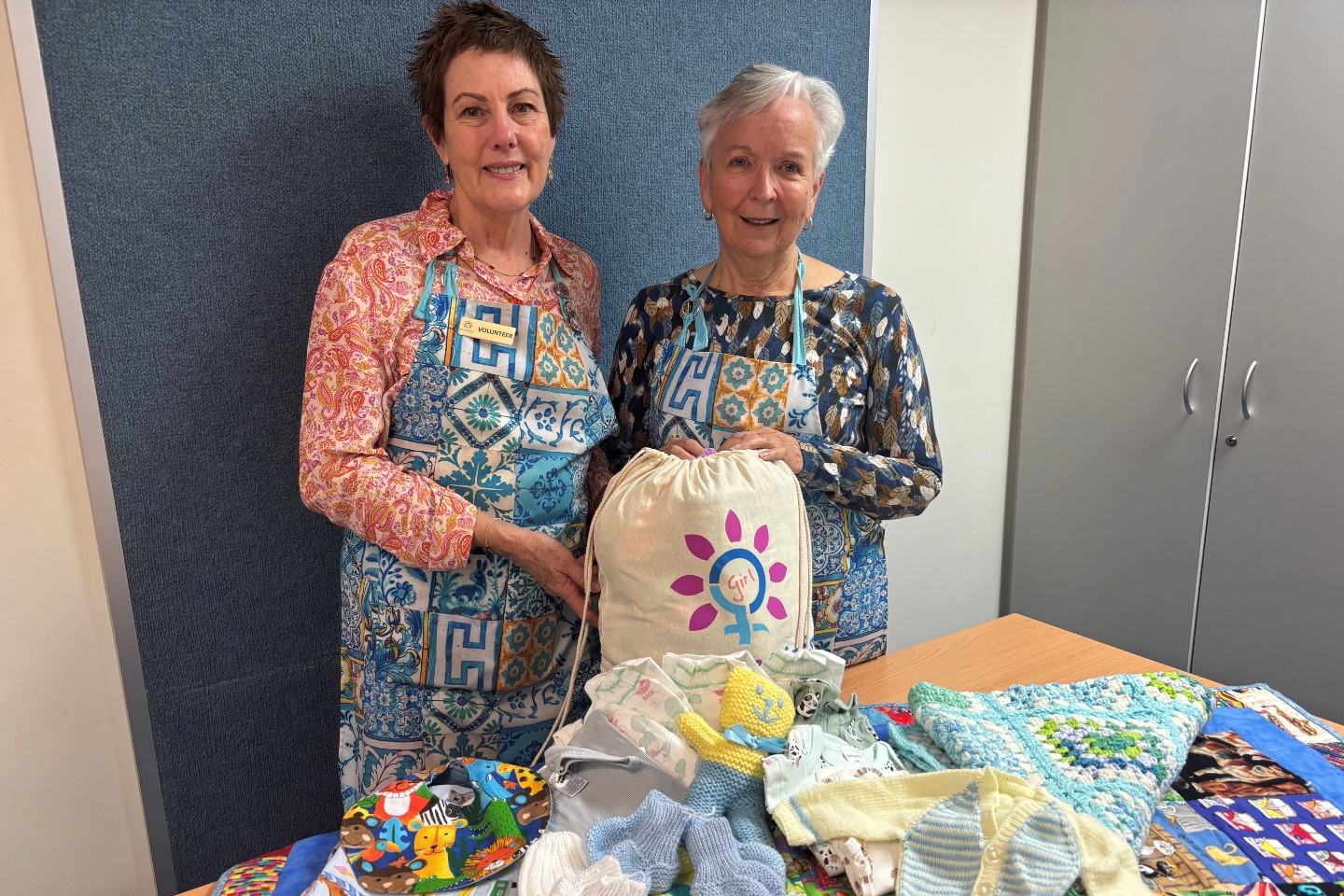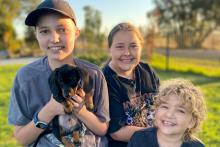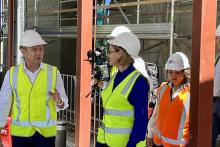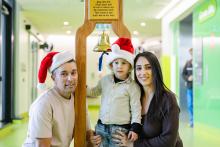Volunteers are the lifeblood of the not-for-profit sector and National Volunteer Week is an opportunity to highlight the vital role volunteers play in the WA community.


Volunteers are the lifeblood of the not-for-profit sector and National Volunteer Week, May 19 to 25, is an opportunity to highlight the vital role volunteers play in the WA community.
Volunteers serving at the Women and Infants Research Foundation have collectively donated more than 40,000 hours to help the foundation deliver its services improving the lives of women, babies and families.
This statistic excludes the volunteer board of directors that guides WIRF and the events and scientific committee members that support the foundation.
Each of these teams are made up of professionals contributing their time, expertise, and networks to advance WIRF’s mission.
Board members play a critical role in providing strategic oversight, governance, and advocacy, while the events and scientific committees provide hands-on support to initiatives including the annual WIRF Gala, the WIRF Scientific Dialogue, and the Research Acceleration Awards.
Additionally, WIRF has an extended network of volunteers based in communities across WA who knit and sew handmade baby clothing and blankets, donating the essential items to families in need.
“Whether our volunteers are knitting, sewing, or offering time ... their contribution has a lasting impact on the lives of women, babies and families." WIRF community engagement officer Paula O’Connell
The impact of volunteers is widespread and long-lasting, from preparing baby bundles for new mothers and babies in crisis, to supporting the foundation’s café, gift shop, and op shop at King Edward Memorial Hospital (KEMH).
The café and gift shop help raise funds that directly support WIRF’s lifesaving research and healthcare programs, while the adjacent op shop sells affordable babywear, maternity clothes and handmade knitted garments, all curated by volunteers.
WIRF community engagement officer Paula O’Connell said the contributions of WIRF’s volunteers reach far and wide throughout the foundation, the hospital and the WA community.
“Whether our volunteers are knitting, sewing, or offering time in our café, op shop, gift shop, or the hospital, their contribution has a lasting impact on the lives of women, babies and families,” Ms O’Connell said.
Due to the increasing pressures of the housing crisis and domestic violence, the hospital’s social work department is experiencing a rising demand for basic supplies to support women and babies in crisis, according to Ms O’Connell.
“Our ability to meet these needs is only made possible by our dedicated on-site volunteer team and our extended community of knitters and sewers,” she said.

Volunteer Marie-Francoise Scott has contributed a decade to the Women and Infants Resarch Foundation's op shop.
Beyond the storefronts, volunteers such as Liz Chidlow and Debbie Salomone assemble baby bundles – essential packs of babywear and blankets distributed through the hospital’s social work team to around 700 mothers and babies in crisis each year.
During National Volunteer Week, WIRF celebrates Ms Chidlow and Ms Salomone, who have each dedicated more than a decade to assembling Baby Bundles and Women’s Care Packages, with their collective efforts supporting around 10,000 vulnerable families.
"This year we celebrate all our amazing volunteers and acknowledge some incredible milestones." WIRF community engagement officer Paula O’Connell
Also included in this year’s celebrations is Maria Crawford, who has volunteered in the WIRF café for 25 years; a milestone that signifies her enduring commitment and community spirit.
Like Ms Chidlow and Ms Salomone, Marie-Francoise Scott has also volunteered with WIRF for more than a decade, helping to run the op shop and make clothing more affordable and dignified for countless women.
In a time when many not-for-profit organisations are grappling with rising demand and shrinking resources, WIRF’s volunteer community is an inspiring model of what can be achieved through compassion, consistency, and collective effort.
“This year we celebrate all our amazing volunteers and acknowledge some incredible milestones,” Ms O’Connell said.
“Their support helps us continue this vital work.”
Connecting communities
Volunteers help charities to deliver critical services to individuals and families in need, but they also create lasting relationships that enrich lives and strengthen communities.
Ronald McDonald House Charities Western Australia had more than 400 registered volunteers working across 12 role types in 2024, supporting the family experience and daily operation of the charity’s three Houses and in-hospital Family Rooms.
Nearly 40 per cent of the charity’s volunteers, known as the Blue Army, have volunteered for more than three years.
RMHC WA volunteer program manager Laura Smith said the volunteer program attracted a diverse array of Western Australians, from university students and corporate professionals right through to retirees.
“Our volunteer program has a strong focus on creating an environment and opportunities that connect volunteers with one another fostering strong relationships built on a common interest in supporting our community,” Ms Smith said.
“By enhancing volunteer experience, our volunteers not only compliment but become an extension of our paid workforce.”

Nearly 40 per cent of the charity’s volunteers, known as the Blue Army, have volunteered for more than three years.
Ms Smith said the volunteer program was professionally managed to not only ensure operational efficiency, but to also facilitate a rewarding experience for RMHC WA’s volunteers.
“We recognise that each individual has a different ‘currency’ for volunteering, whether it’s connection, purpose, learning, or giving back, so we focus on creating meaningful engagement beyond just the shift,” Ms Smith said.
“This includes clear communication, tailored roles, recognition initiatives, and ongoing feedback.
“By understanding their motivations and valuing their time, we foster a positive culture that keeps volunteers committed, even without financial compensation. A simple ‘thank you’ goes a long way.”
Ms Smith, who celebrates 10 years of leading RMHC WA’s volunteer program in July this year, said she still loved her job.
“The variety keeps it exciting,” she said.
“From recruitment and rostering, to compliance, supporting corporate and community teams in our cooking programs, managing volunteers at major events, and celebrating and recognising the ongoing contributions.
“My role has never been stagnant, especially as we’ve gone through incredible growth since my early days. It’s allowed me to grow alongside the volunteer program.
“Above all, it's the people, our Blue Army, who inspire me every day. They feel like an extension of family and I especially love watching the friendships that form across generations and backgrounds. It’s something really special.”

RMHC WA had more than 400 registered volunteers working across 12 role types in 2024.
RMHC WA volunteer Banjan said volunteering had been rewarding in more ways than one.
“Beyond the practical side, volunteering provides a sense of belonging and personal purpose alongside my career and studies,” they said.
“I like to believe, inspired by the idea of the butterfly effect, that a simple act of kindness ripples outward and creates many more.
“The smiles from the families have also kept me coming back, knowing I could offer some help during a difficult time in their lives.”
Another volunteer, Rueben, also said the patients were the reason he continued to volunteer.
“I love to connect with and talk to people, it’s one of my favourite things to do,” they said.
“A lot of [the patients] are so full of joy and happiness to be away from the hospital environment and have the ability to just be a kid. Being able to help create that space for them is pretty awesome.
“Another big part is the other volunteers; they're all amazing people with incredible stories.
“After finishing my first shift, I found the experience rewarding as it really does make an impact.”
Spreading smiles among sick children
Perth Children’s Hospital Foundation’s much-loved mascot, Stitches the Bear, is always in the thick of the action supporting WA’s sick kids and their families.
From abseiling down the QV1 building and throwing punches to raise funds for childhood cancer, to playing cricket with the Scorchers and chaperoning West Coast Eagles players on hospital visits.

PCHF mascot Stitches with the Perth Scorchers.
Behind the beloved bear mascot, is a team of dedicated PCHF volunteers who are passionate about bringing joy and comfort to sick children and their families as they experience challenging times.
PCHF volunteer Elsie Clelland said it was special to see the smiles Stitches brought to the faces of patients and their loved ones.
“Knowing that could be the only smile of the day or that a photo will be treasured is priceless,” Ms Clelland said.
“There have been a number of times tears of joy have been shed. Also tears of disbelief, gratitude, awe, and joy. I also love it when Stitches is able to bring a smile to staff who care for the children and their families.
“Giving to others, sharing love, happiness and joy is priceless at any time, but when it is done in challenging circumstances, the rewards to everyone are unique and significant. I would be Stitches every day if I could.”
Volunteers play an invaluable role donating their time and energy to help PCHF improve and brighten young lives impacted by illness and injury.
About 70 volunteers assist with PCHF events, the hospital gift shop and fundraisers, including the recent Punching for a Cure challenge and Christmas gift wrapping.

Stitches at the Punching for a Cure challenge with PCHF CEO Carrick Robinson (left) and Medical Research Minister Stephen Dawson.
During National Volunteer Week, PCHF celebrates all of its generous volunteers, such as Vanessa Brunetto who has volunteered with the foundation for more than 10 years in a variety of roles, including helping bring Stitches to life.
Ms Brunetto said she saw the opportunity to be a mascot for PCHF and immediately knew it was something she wanted to do.
“Once I have the bear suit on, you wouldn’t even know it’s me. He is my alter ego,” she said.
“I always walk away with such a full heart and a big smile on my face.”
PCHF offers flexible volunteering opportunities including options for corporates to give back. If you or your team would like to volunteer at PCHF and make a meaningful difference to sick children, please visit: Volunteer with us - Perth Children's Hospital Foundation













